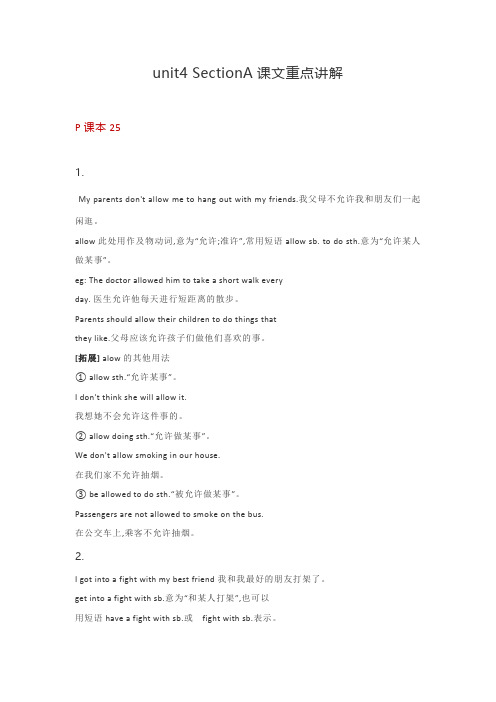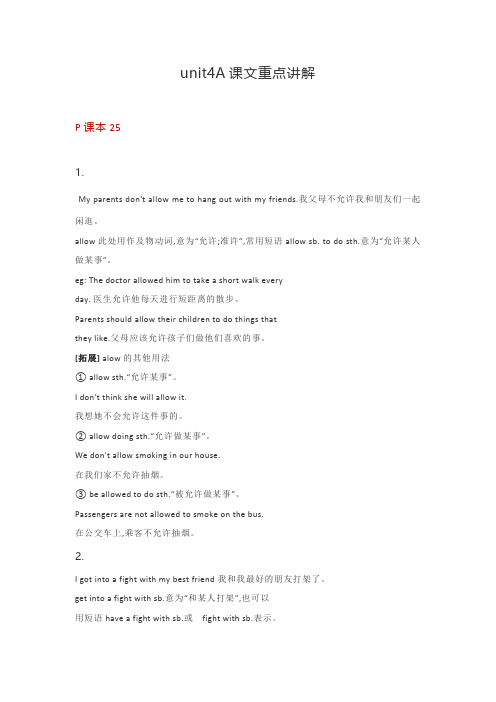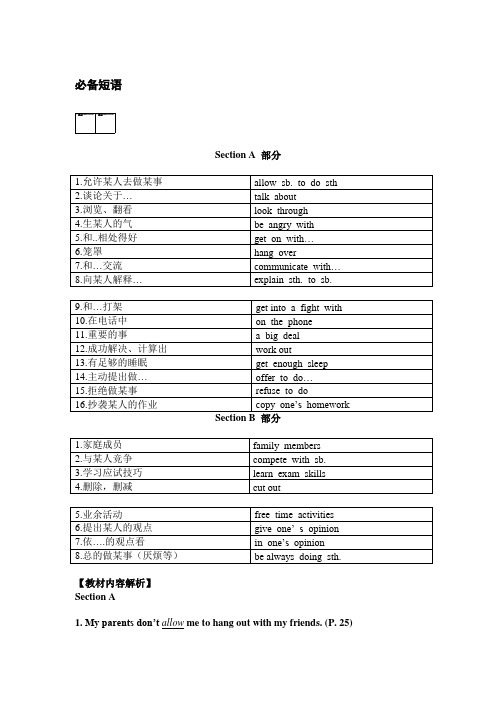八年级下册unit4SectionA课文重点难点讲解
人教八年级英语下册Unit4 Section A 课文讲解

unit4 SectionA课文重点讲解P课本251.My parents don't allow me to hang out with my friends.我父母不允许我和朋友们一起闲逛。
allow此处用作及物动词,意为“允许;准许”,常用短语 allow sb. to do sth.意为“允许某人做某事”。
eg: The doctor allowed him to take a short walk everyday. 医生允许他每天进行短距离的散步。
Parents should allow their children to do things thatthey like.父母应该允许孩子们做他们喜欢的事。
[拓展] alow的其他用法① allow sth.“允许某事”。
I don't think she will allow it.我想她不会允许这件事的。
② allow doing sth.“允许做某事”。
We don't allow smoking in our house.在我们家不允许抽烟。
③ be allowed to do sth.“被允许做某事”。
Passengers are not allowed to smoke on the bus.在公交车上,乘客不允许抽烟。
2.I got into a fight with my best friend我和我最好的朋友打架了。
get into a fight with sb.意为“和某人打架”,也可以用短语 have a fight with sb.或fight with sb.表示。
eg: We can't get into a fight with each other at school在学校我们不能相互打架。
3.What' s wrong?怎么了?1) What's wrong?是口语中常用的一个句型,相当于What's the matter?其主要用法有:①用于询问某人有什么问题或有什么不顺心的事,意为“怎么了?/出什么事了?/哪儿不舒服?”。
八年级英语下册:Unit4HesaidIwashard-workingSectionA内容详解人教新目标版

Unit 4 He said I was hardworkingSection A 内容详解Language Goal:Report what someone said语言目标:报告某人所说内容1aGRIYOWIRK 小组活动Talk about these questions.讨论这些问题。
What is a soap opera? 什么是肥皂剧?What are some soap operas you know? 你知道多少肥皂剧?Do you ever watch soap operas? 你曾看过肥皂剧吗?What are some things that happen in soap operas?肥皂剧里都讲述了一些什么故事?What did Marcia say? 马西娅说什么了?She said she was having a surprise party for Lana on Friday night.①她说周五晚上她要参加一个为兰娜准备的惊喜聚会。
I'm having a surprise party for Lana on② Friday night.周五晚上我要参加一个专为兰娜准备的惊喜聚会。
I'm mad at③ Marcia.我正在跟马西娅生气。
I'm not going to her house on Friday night.周五晚上我不会去她家的。
Lana thinks she's coming to my house to study.兰娜打算来我家学习。
1bListen and number the statements[1—4]in the picture.听并给图画里的陈述编号。
听力原文Girl 1:What did Marcia say? 马西娅说什么了?Girl 2:She said she was having a surprise party for Lana On Friday night.她说周五晚上她要参加一个为兰娜准备的惊喜聚会。
人教八年级英语下册第4单元 Section A 课文讲解

unit4A课文重点讲解P课本251.My parents don't allow me to hang out with my friends.我父母不允许我和朋友们一起闲逛。
allow此处用作及物动词,意为“允许;准许”,常用短语 allow sb. to do sth.意为“允许某人做某事”。
eg: The doctor allowed him to take a short walk everyday. 医生允许他每天进行短距离的散步。
Parents should allow their children to do things thatthey like.父母应该允许孩子们做他们喜欢的事。
[拓展] alow的其他用法① allow sth.“允许某事”。
I don't think she will allow it.我想她不会允许这件事的。
② allow doing sth.“允许做某事”。
We don't allow smoking in our house.在我们家不允许抽烟。
③ be allowed to do sth.“被允许做某事”。
Passengers are not allowed to smoke on the bus.在公交车上,乘客不允许抽烟。
2.I got into a fight with my best friend我和我最好的朋友打架了。
get into a fight with sb.意为“和某人打架”,也可以用短语 have a fight with sb.或fight with sb.表示。
eg: We can't get into a fight with each other at school在学校我们不能相互打架。
3.What' s wrong?怎么了?1) What's wrong?是口语中常用的一个句型,相当于What's the matter?其主要用法有:①用于询问某人有什么问题或有什么不顺心的事,意为“怎么了?/出什么事了?/哪儿不舒服?”。
人教版新目标英语八年级下册英语unit4重点短语和句子分析

必备短语Section A 部分【教材内容解析】Section A1. My parents don’t allow me to hang out with my friends. (P. 25)① allow doing sth. 允许做某事翻译:The shopkeeper (店员) doesn’t allow smoking in any corner of the shop.__________________________________________② allow sb. to do sth. 允许某人做某事翻译:His parents allow him to play computer games if he finishes his homework. ____________________________________________2. I got into a fight with my best friend. (P. 25)get into a fight with sb.意为“和某人打架”,相当于have a fight with sb.或者fight with sb.。
翻译:He got drunk (醉酒的) and got into a fight with Jim._________________________________________3. What’s wrong? (P. 25)What’s wrong?意为“怎么了?”,用来询问对方有什么问题或者不顺心的事,What’s wrong with...?意为“……怎么了?”,后接sb.或者sth.,用来询问某人或者某物怎么了?---What’s wrong with you, Jim?---I left my umbrella on the bus.【拓展】询问“怎么了?”,主要有以下几种句型:What’s wrong (with sb./sth.)?What’s the matter (with sb./sth.)?What’s the trouble (with sb./sth.)?What’s up (with sb./sth.)?4. I’m really tired because I studied until midnight last night. (P. 25)until表示“直到”和延续性动词连用,意为一个动作一直持续到某个点为止;同短暂性行动连用时,用于“not...until”结构中,表示“直到……才……”。
人教版英语八年级下册Unit4 SectionA教材知识详解

Unit4 SectionA教材知识详解1.My parents don’t allow me to hang out with my friends.我父母亲不允许我和朋友一块儿闲逛。
allow v. 允许;准许。
allow sb.(not) to do sth.(不)允许某人做某事。
如:My parents don’t allow me to stay up late. 我父母不允许我熬夜。
be allowed to do sth.被允许做某事;allow doing sth.允许做某事。
2.W hy don’t you go to sleep earlier this evening?你今晚为什么不早点睡觉?Why don’t you do sth.?是提建议的句型,相当于Why not do sth.?意为:为什么不……?后面要加动词原形。
如:Why don’t you write to me?=Why not write to me ?表示建议的其它句型:1) What about doing sth.? ……怎么样?如:What about going to the park?去公园怎么样?2) How about doing sth.?……怎么样?如:How about going to the park? 去公园怎么样?3) You’d better do sth. 你最好……。
如:You’d better do your homework now.你最好现在做作业。
4) Let sb. do sth. 让某人做某事。
如:L et’s go to the park.咱们去公园吧。
3.You should call him so that you c an say you’re sorry.你应该给他打电话这样你就能对他说对不起了。
so that引导目的状语从句时,表示“以便;为了”。
英语人教版八年级下册Unit4 SectionA Period1 教材分析

教材分析一、话题功能本单元是初中英语新目标八年级下册第四单元,本单元的核心话题为“人际交往”,围绕着主动提供帮助,以观察图片、听力理解、阅读理解等训练方式和独立学习、合作交流、完成任务等形式完成目标语言的输入,学习“You should…/Why don’t you …/Why not…”等句型和一些重要动词短语为主要学习内容,并且设置任务型综合性语言实践活动,让学生在交际活动中,学会如何正确地用英语表达自己的意见和建议,重在培养学生的习得语言运用能力、实践能力、合作能力及创新意识。
二、本课任务本节课是本单元的第一课时。
第一课时围绕“Problems and advice”展开话题,前半部分围绕“What’s wrong? What should I do?”学习目标语言,后半部分围绕2d对话解决情境任务。
在熟悉和操练各个动词词组的基础上通过各种各样活动的开展培养学生的综合语言应用能力。
三、课本整合以问答呈现问题和解决的办法的形式是对课本1a和1b部分的整合。
因为本课是听说课,需要学生大量的听说练习,而1a原本的设计是陈述句,便于学生思考,不利于学生活动。
整合以后学生就可以展开对话,谈论练习中就习得了语言。
所以怎样设计课堂活动,采取怎样的方式来提高课堂气氛,从而使学生自然地融入整个教学环节,并落实基础知识就显得尤为重要。
四、内容标准1、技能:能听懂有关熟悉话题的谈话,并能从中提取信息和观点。
能用短语或句子对所展示的图片进行描述,编写简单的对话,参与小组合作和小组展示活动。
2.情感态度:对英语学习表现出积极性和初步的自信心。
能在英语交流中注意并理解他人的情感。
3.学习策略:能尝试使用适当的学习方法,克服学习中遇到的困难。
4.文化意识:在交际中注意到中外交际习俗的差异。
五、教学目标:1. 语言知识目标:1) 学习并掌握以下单词和句型:wrong, guess, deal,work out, look throughallow sb. to do sth.,①—What’s wrong?—I have to study too much so I don’t get enough sleep.What should I do?—You should talk to your parents./Why don’t you talk to your parents?=Why not talk to your parents?② It’s not a big deal.③ Hope things work out.2) 学习并掌握以下用法:(1)能够运用所学知识谈论问题和困难、提出建议并做出选择;(2)能根据对方所提出的问题,给出一些合理的建议。
鲁教版英语(五四制)八年级下册_Unit4_Section_A_课文重难点讲解

Unit4 Section A 课文重难点讲解1. by asking the teacher for help 通过向老师求助。
(课本第1页1a)by 介词,通过,靠。
表示方法、手段,其后可接名词、代词或动词-ing形式。
I memorize the new words by reading the text. 我通过读课文来记忆新单词。
拓展:◆by的用法:(1)by doing sth 通过…方式by studying with a group【注】介词短语作方式状语,回答以How开头的问句,表示“怎样做”。
①I study English by _____(listen) to the tapes②Tom learns Chinese by ______(watch) Chinese movies.③—____ did you get there? —By ___ a taxi.A. How; takingB. How; takeC. How; tookD. What; taking(2) by+ 交通工具(交通工具前不能加限定词)by bike by train【by短语】by the way 顺便问一下by accident= by chance 偶然地by mistake 错误地one by one 一个接一个step by step 一步一步地little by little 逐渐地by the time 到……为止by oneself 独自地by and by 不久之后by hand 用手by the end of 到….... 末尾2. How do you study for a test?你如何为考试而学习?(课文第1页1c)(1) How引导的特殊疑问句用来询问“方式”。
—How did you catch a cold?你是怎么感冒的?—By staying in the rain.;淋雨得的。
英语人教版八年级下册unit4 sectionA

Unit4 Why don’t you talk to your parents ?Section A(3a-3c) 一教材分析1、该教学内容是两封英文书信,词汇量大,对学生来说理解起来有很大的难度,所以本节课以任务型教学为主。
2、这两封信,我们逐封突破,旨在训练,发展学生的阅读能力,信的主题贴近学生生活实际,高度关注青少年的心理健康和情感教育,不仅浮现和巩固了关于烦恼和建议的句型和相关词汇,还输入了更加丰富的词汇和语言表达。
对于这类文章,我们充分发挥思维导图的作用,让学生problems和advice这两个方面去梳理文章的脉络,有助于学生更好地理解课文,进一步锻炼学生复述故事的能力。
二学生分析1、由于学生是八年级的学生,经过了一年多的学习,掌握了一定的语言能力,对英语的分析能力也比七年级有了很大的提高。
但阅读技能的培养还不能放松,所以我们在教学的环节里面除了注重学生的语言知识的学习外,还为学生设置了不同的阅读微技能活动。
2、我们的学生来自农村,基础薄弱,在英语学习上有不少困难,所以我们充分发挥思维导图的优势,设置的任务台阶低、密度大、层次性强,力争给有差异的学生设置合适的教学目标,在发展学生自信心的基础上激发学生的求知欲。
3、由于当代中学生绝大多数是家里的独生子女,所以养成了他们很多人以我为中心的心理,他们中有些人社会意识淡薄,认识不够深刻,学习方法比较单一,知识掌握不牢固,但好奇心较强,应采用形象生动,形式多样的教学方法去激发学生学习的兴趣。
三、教学目标1、通过学习,学生应该能学会文段中出现的重点句型,词汇和短语。
(知识目标)2、通过学习,学生能够在阅读中利用图片信息进行预测并获取文章大意。
(技能目标)3、在细读文章的基础上,学生可以借助思维导图的提示概括文章大意进而能够复述课文。
(技能目标)4、通过学习Sad and Thirteen的真实经历,告诉学生人的一生并不都是一帆风顺的,难免有一些挫折和困难,如果生活中发生了一些不尽如人意的问题,我们学会冷静对待,学会用合理的办法去理性地去解决。
- 1、下载文档前请自行甄别文档内容的完整性,平台不提供额外的编辑、内容补充、找答案等附加服务。
- 2、"仅部分预览"的文档,不可在线预览部分如存在完整性等问题,可反馈申请退款(可完整预览的文档不适用该条件!)。
- 3、如文档侵犯您的权益,请联系客服反馈,我们会尽快为您处理(人工客服工作时间:9:00-18:30)。
Unit 4 Why don’t you talk to your parents?Section A1.Why don’t you talk to your parents? 你为什么不和你打父母谈谈呢?【解析】Why don't you do sth ?= Why not do sth? 为什么不......呢?【拓展】用于提建议的句型有:(1)What about doing sth ?=How about doing sth? ….怎么样?(2)Why don’t you do sth?= Why not do sth? 为什么不呢?(3)Let’s do sth.让我们一起做某事吧。
(4)Shall we/I do sth?我们做…好吗?(5)had better do/not d o sth 最好做/不做某事(6) Will/Would you please do sth 请你做…好吗?(7) Would you like t o do sth? 你想去做某事吗?(8)Would you mind doing sth?你介意做某事吗?【回答】(1). 同意对方的建议时,一般用:◆Good idea./ That’s good idea. 好主意◆OK/ All right./ Great 好/ 行/太好了◆Yes, please ./ I’d love to 是的/ 我愿意◆I agree with you 我同意你的看法◆No problem 没问题◆Sure/ Of course/ Certainly 当然可以◆Yes, I think so 对,我也这样想(2).对对方的帮助或要求表示委婉谢绝时,一般用:◆I don’t think so 我认为不是这样◆Sorry, I can’t 对不起,我不能◆I’d love to, but…◆I’m afraid…我愿意,但恐怕……35.— Why not go to Lao She Teahouse tonight? — ______.A. It doesn't matterB. Thank youC. Sorry to hear thatD. Sounds great25.—I feel really tired. —______A. Lucky you!B. You’d better work harder.C. Congratulations!D. Why not go and have a rest?37. —It’s a nice day, isn’t it?—Yes. ______ going hiking and relax ourselves?A. Why notB. Why don’tC. What aboutYou look too tired. Why not _____ a rest?A. Stop to haveB. to stop havingC. stop having2.I have to study too much so I don’t get enough sleep.我要学的太多,因此我睡眠不足。
【解析1】(1)too many + 复数名词许多too many people(2)too much +不可数名词许多too much homework(3)much too +形容词太… much too cold【2013山东德州1】—What’s the matter?—I have a stomachache. Maybe I have eaten ___ tonight.A. too muchB. too manyC. much too【解析2】so conj. 因此(表示因果关系,后面跟表示结果的句子,不与because同时使用)【2013浙江舟山、嘉兴1】18. The shops were closed_______ I didn't get any milk.A. soB. asC. orD. but3.My parents don’t allow me to hang out with my friends.我的父母不允许我和我的朋友们出去闲逛。
【解析】allow sb. to do sth 允许某人做某事【拓展】allow v 允许allow doing sth 允许做某事They don’t allow smoking.allow sb. to do sth 允许某人做某事My mother allows me to watch T V.be allowed to do sth 被允许做某事①We don’t allow ___________(smoke) in the reading room.②Our teacher allows us ____________(go) out for a walk.③The boy should be allowed____(play) after supper.④We won’t allow ________in the cinema .But you are allowed ______in the rest room.(smoke)⑤Teenagers should ___________ (allow) to choose their own clothes.【2013辽宁鞍山3】25. —Can I smoke in the dining hall? —Sorry. It's not_________.A. promisedB. realizedC. allowedD. reminded【拓展】allow与let的辨析:allow指“允许”,表示“默许,听任,不加阻止”,allow sb to do sth允许某人做某事。
Let指“让”,let sb do sth让某人做某事,语意较弱,多用于口语中,let不能用于被动语态。
4. What’s wrong?怎么啦?【解析】What’s wrong( with sb./ sth) (某人/物)怎么了?【2013四川南充】—Mum , I’m not feeling well. —Oh, dear! _____.A. What’s wrongB. Not at allC. All right.5.I’m really tried because I studied until midnight last night.我真的很累,因为我昨天晚上一直学习到半夜。
【解析】until 直到......时【2013山东临沂2】23. Please hold on to your dream _____ one day it comes true.A. ifB. untilC. unlessD. though【2013山东青岛3】13. If you have trouble pronouncing these words, you canrepeat them over and over again ______ you are comfortable with them.A. unlessB. ifC. untilD. while【2013浙江丽水3】18. —Hey, man. You can’t cross the street now. You have to wait _____ the traffic turn green.—Oh, sorry and thank you.A. whenB. afterC. untilD. while6.Why don’t you go to sleep earlier this evening?今天晚上你为什么不早点睡觉呢?【解析】go to sleep 去睡觉(强调“入睡,睡着”这一动作)7. You look sad, Kim. 金,你看起来很伤心。
【解析】look 看起来(系动词,后跟形容词作宾语)【2012江苏苏州3】Some of friends eat with their eyes. They prefer to (更喜欢)what ____ nice.A. feelsB. smellsC. looksD. tastes【拓展】:系动词:后跟adj.作表语一是:(be)am /is /are be quiet=keep quiet 保持安静二保持:stay/keep (表示持续状态)stay healthy=keep healthy 保持健康三变化:become/get/turn (表示状态变化)五起来:sound/look/smell/taste/feel (表示感觉)( )Jack usually gets ______ when he speaks in public.A. happilyB. excitingC. worriedD. tired( ) Tom’s father looks very _____. But he is very kind.A. seriouslyB. seriousC. friendly8.You ____ call him up.你____ 给他打电话。
【解析】call up (v + adv) call on 拜访;号召I call up my parents every Sunday.9.Well, I found my sister looking through my things yesterday. 哦,昨天我发现我妹妹翻了我的东西。
【解析1】find sb. doing sth 发现某人正在做某事Mr. Wang found Li Dong reading a storybook in the class.类似动词:hear,watch, see, feel【贵州安顺】When I went into the room, I found ___ in bed.A. him lyingB. he lyingC. he liesD. him was lying【解析2】look through 浏览【拓展】与look相关的短语:look for 寻找look after=take care of照看look like看起来像look the same看起来一样look over检查,复习look through温习,检查look out小心,从里向外看look up向上看,查单词look around环视look forward to期望【2013四川泸州】9. Can you help me to _______ my dog when I leave for Hong Kong?A. look afterB. look foC. look atD. look through【2013湖北十堰】30. Here is the book. First _________ it and then tell me what you think of it.A. look intoB. look throughC. look upD. look after10. Yes, but I’m still angry with her. 是的,但是我仍然很生她的气。
